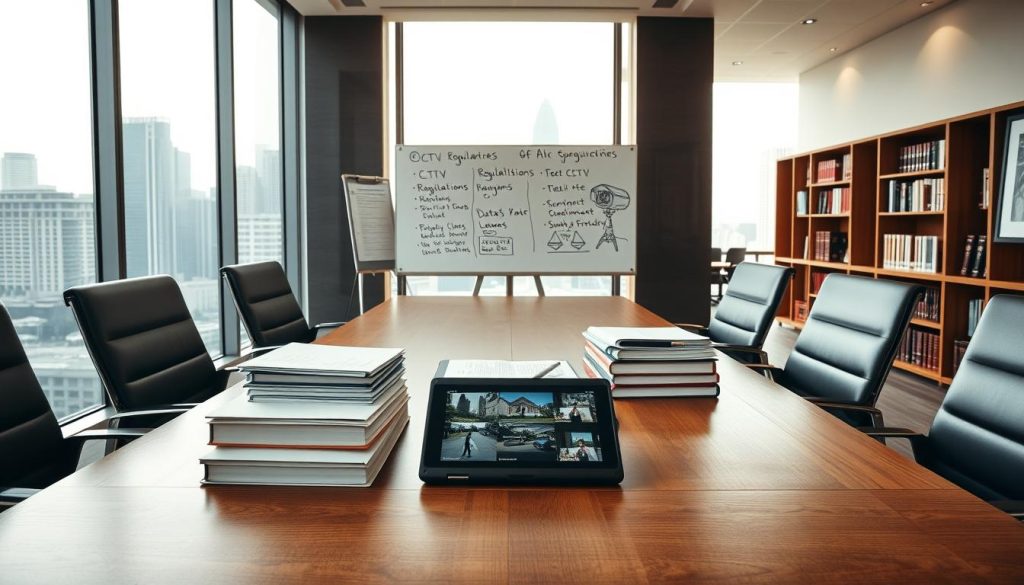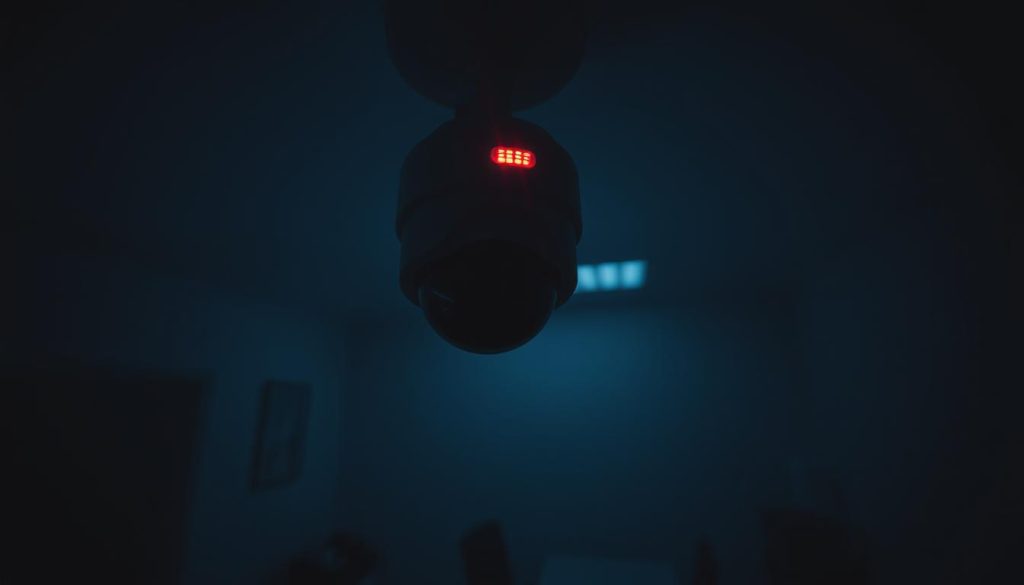It’s important to know how CCTV cameras work for security. Many wonder if they can record when turned off. CCTV cameras need power to work, so they stop recording when turned off or disconnected.
This shows why keeping them powered up is key for good surveillance. Misunderstandings about CCTV tech can cause confusion. It’s important to understand how they work and what they can do.
Key Takeaways
- CCTV cameras need a power source to function effectively.
- Switching off CCTV cameras halts all recording activities.
- Continuous power supply is critical for surveillance reliability.
- Common misconceptions can lead to doubts in security measures.
- Understanding technology helps clarify CCTV operational capacities.
Understanding CCTV Technology and Functionality
CCTV technology is key in today’s security systems. It helps in monitoring and protecting different places. Knowing what CCTV is and the types of cameras available helps choose the right system for your needs.
What is CCTV?
Closed-Circuit Television (CCTV) uses video cameras to send signals to a specific place for watching. It boosts security by letting people see things live and record them for later. CCTV is used in many places to prevent crime and keep people safe.
Types of CCTV Cameras and Their Features
It’s important to pick the right CCTV camera for good surveillance. There are many types, each with special features for different needs:
- Dome CCTV Cameras: Great for retail and public areas, they are unobtrusive but cover a lot of ground.
- Bullet CCTV Cameras: Visible and meant for outdoor use, they scare off criminals.
- C-Mount Cameras: Have removable lenses for capturing images from far away.
- PTZ Cameras: Can move, tilt, and zoom, making them flexible for watching big areas.
- Day/Night Cameras: Work well in any light, perfect for day and night use.
- Infrared/Night Vision Cameras: Needed for dark places, they work in complete darkness.
- IP Cameras: Connect to the internet for remote viewing, great for watching from anywhere.
- Wireless Cameras: Popular for their ease of use, they fit well in many settings.
How Do CCTV Cameras Work?
CCTV cameras are complex systems that capture and record different environments. They work well because of several key parts working together. Knowing these parts helps us understand how CCTV systems work.
Basic Components and Their Roles
At the heart of a CCTV camera, several important parts play key roles:
- Lenses: These focus on the area being watched, affecting the view and focus.
- Sensors: They turn light into electronic signals, making the images in the footage.
- Recording Devices: These are needed to save the footage, allowing it to be seen later.
Power Requirements for Operation
CCTV cameras need a steady power supply to work well. Most systems need a stable electricity source. Power issues can cause problems, like breaks in recording and watching. It’s important to choose reliable power options for a CCTV system to work best.
Can CCTV Cameras Record When They Are Switched Off?
It’s important to know what CCTV cameras can and can’t do. Many wonder if cameras can record when they’re turned off. This myth can lead to confusion about how well they work.
Explaining the Recording Capabilities
CCTV cameras need power to work right. When they’re off, they can’t capture any footage. Any incident that happens when they’re not on won’t be recorded.
Some newer systems might have a backup that records for a short time without power. But they always need power to keep recording.
Common Misconceptions Surrounding Camera Functionality
Some people think certain lights mean a camera is recording, even when it’s off. This can make users think they’re always being watched. Knowing how cameras really work helps pick the best ones. For more info, check out this resource.
Modes of Operation for CCTV Cameras
CCTV cameras have different recording modes for various needs. Knowing these modes can make monitoring more effective.
Continuous vs. Motion-Activated Recording
Continuous recording captures footage all the time. It’s key for high-security areas, documenting every moment. But, it can use a lot of storage, which might be a problem for some.
Motion-activated recording saves space by only recording when there’s movement. It’s great for places with less traffic, as it cuts down on unnecessary footage. Users can adjust the sensitivity to catch more or less movement.
Standby Mode Functionality
Standby mode lets cameras stay on without recording. It’s good for saving energy and extending the system’s life when there’s no activity. When motion is detected, it quickly switches to recording, so no important events are missed.
The Importance of Power Supply
A reliable power supply is key for CCTV cameras to work right. It’s very important because it lets these systems watch and record what’s happening. Without steady power, watching over places becomes hard, leaving them open to danger.
Battery backup solutions are key for keeping recording going without a hitch. Many CCTV systems have batteries that can be charged again. These battery backup systems help cameras keep working even when there’s no power. For more on how long CCTV can record without power, see this resource.
For even more reliability, Uninterruptible Power Supplies (UPS) are used. UPS units give power for a short time when there’s an outage. This lets cameras keep watching without a break. This is super important for places that need extra security, like shops and hospitals.
When outages last a long time, using a generator is a big help. Generators give strong power that keeps the whole security system working. This is why using a generator is so important for keeping surveillance going strong.
Technical Limitations of CCTV Systems
CCTV systems have several technical limits that can affect their performance. It’s important to know these issues when choosing a surveillance system. One big problem is power outages, which can stop recording and disrupt security.
Impact of Power Outages on Recording Capabilities
Power outages are a major challenge for CCTV systems. When the power goes out, cameras stop working. This means no recording and a loss of security. Even backup batteries might not work fast enough.
This shows the need for reliable backup systems.
Internet Dependency for IP Cameras
IP cameras are great because they can connect to the internet and be accessed remotely. But, they have their own limits. They need the internet to work. If the internet goes down, they can’t monitor or record in real-time.
Knowing this helps users find strong network solutions to keep surveillance going.
Misinformation About CCTV Recording
Misinformation about CCTV can weaken surveillance systems. Many think wrong things about CCTV, leading to bad installations. It’s key to know the truth to keep places safe.
Dispelling Myths: Do Cameras with Lights Record?
Many believe cameras with blinking lights are always recording. This can make people think they’re safe, but it’s not true. Most real security cameras don’t have flashing lights.
They are made to be hidden, not seen. If people think cameras are off because of lights, they might not be safe.
Understanding Real vs. Fake Cameras
Some think fake cameras are enough for security. But, they don’t really help keep places safe. Knowing the difference helps make better choices.
Real CCTV systems have features that really help security. Fake ones don’t offer any protection or warning.
Best Practices for CCTV Surveillance
Using the best practices for CCTV surveillance makes your security system work better. Keeping your cameras in good shape is key. This means checking them often, making sure they’re easy to get to, and adjusting their settings.
Choosing the right camera is also very important. Think about where you’ll use it, indoors or outdoors. Cameras have different features like night vision and how clear they are, based on what you need.
Regular Maintenance and Monitoring
Having a regular maintenance plan helps your CCTV systems last longer. Important maintenance steps include:
- Cleaning lenses to avoid obstructions that hinder image quality.
- Checking connections and ensuring all components are securely attached.
- Updating firmware regularly for enhanced functionality and security.
- Testing recording equipment and ensuring all cameras are operational.
Choosing the Right Camera for Your Needs
When picking cameras, consider these points:
- Type of environment: Indoor or outdoor.
- Level of illumination: Does the area have adequate lighting?
- Resolution and image quality required for identification.
- Specific features needed: Motion detection, zoom capabilities, etc.
By following these best practices, you can make your CCTV system more reliable and effective.
Legal Considerations Regarding CCTV Surveillance
In Singapore, CCTV systems must follow strict legal rules. These rules help protect privacy and data. Companies must understand these laws to avoid legal trouble. It’s important to use CCTV technology in an ethical way.
Understanding Privacy Laws in Singapore
Privacy laws in Singapore control CCTV cameras. The Personal Data Protection Act (PDPA) says companies must tell people when they’re being recorded. They also need consent in many cases. This law covers both private and public areas, making it clear that CCTV use must be open.
Following these laws helps avoid fines and legal problems.
Implications of Turning Off CCTV Systems
Turning off CCTV systems has big CCTV implications for security and trust. Without them, it’s hard to record incidents. This makes solving disputes or crimes harder.
So, companies must think carefully about turning off CCTV cameras. They need to balance this with their legal duties to keep a good surveillance system.

Next Steps for Effective CCTV System Setup
Setting up a strong CCTV system needs careful planning. You must think about the area you want to cover and the cameras you need. Knowing your property’s layout in Singapore is key to placing cameras right.
This ensures you don’t miss any spots and your system works well. It’s important to avoid blind spots for effective surveillance.
Working with security experts is a good idea if you want a custom solution. They know the latest in camera tech. Their advice helps create a system that fits your needs, making you feel safer.
Don’t forget to set up a maintenance plan for your CCTV system. Regular checks and updates keep it running smoothly. This way, you can build a strong security system that keeps you safe.

